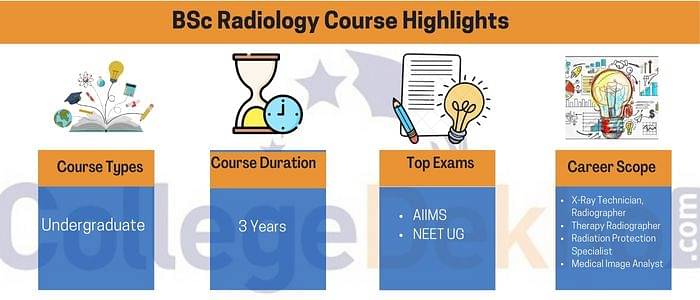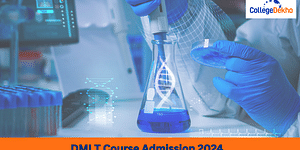BSc Radiology
BSc Radiology Overview
BSc Radiology or Bachelor of Science in Radiology is a three-year undergraduate degree programme that focuses on the usage of medical imaging technology for the diagnosis and treatment of patients. The syllabus for radiology courses is generally decided by the college or university offering the course. However, there are a few common areas of study like human anatomy, pathology and physiology. They are further acquainted with the procedures of clinical training, the aspects of different types of imaging modalities, and radiographic procedures. Graduates in Radiology can pursue successful careers as Radiology Technician, Ultrasound Technician, Radiologist, Radiation Therapist, MRI Technician and more.
As far as the eligibility criteria of radiology courses is concerned, a candidate must have secured an aggregate of 50% marks in Class 10+2 from an accredited board in the Science stream (Physics, Chemistry, Biology). In addition to merit-based admissions, admissions in 2024 to radiology courses are conducted through entrance exams as well. A candidate ought to score marks in the entrance exam in accordance with the decided cut-off to successfully secure a seat in a medical college or university. On an average, the course fee for radiology ranges from about INR 14,000 - 6.3 LPA.
In order to make a successful career out of Radiology, a candidate must pay attention to detail, have a keen eye, excellent research skills, the ability to interpret technical data, and a candidate must possess the ability to use radiography equipment with extreme precision. Following the completion of their course, candidates can go for jobs in radiology fields such as X-Ray Technician, Radiographer, Therapy Radiographer, Radiation Protection Specialist, Medical Image Analyst, etc. Candidates can expect a salary range of INR 2 - 6 LPA.
Table of Contents
- BSc Radiology Overview
- BSc Radiology Latest Update
- BSc Radiology Course Highlights
- Who should do a BSc Radiology Course?
- Why Choose BSc Radiology?
- What is the Difference Between BSc Radiology vs BSc Radiography?
- Types of BSc Radiology Courses
- BSc Radiology Eligibility Criteria
- BSc Radiology Entrance Exams
- BSc Radiology Course Admission Process in India
- Direct BSc Radiology Admission Process Without Entrance Exam
- BSc Radiology Fee in India
- BSc Radiology Syllabus and Subjects
- Best Books for BSc in Radiology Course
- Top Private BSc Radiology Colleges in India
- Top Government BSc Radiology Colleges in India
- BSc Radiology Top Colleges in India
- Career Options After BSc in Radiology
- Courses After BSc in Radiology Degree
- BSc Radiology Scope in India
- FAQs about B.Sc Radiology
BSc Radiology Latest Update
- CUET UG 2025 Exam dates will be announced soon on the official website of NTA. To know about the details, syllabus of BSc Radiology, preparation tips and latest notifications, click on CUET UG 2025 to get all the required information.
- NEET UG 2025 notification is out now. To know more about its expected date, syllabus, eligibility criteria and more, click at NEET UG Exam 2025.
- AIIMS conducts the BSc Paramedical Exam on an annual basis to admit students in the radiology course. Click at AIIMS BSc Paramedical Exam 2025 to get updates of its upcoming schedule and more.
BSc Radiology Course Highlights
The table below illustrates the highlights of a radiology course -
| Name of Degree | BSc in Radiology |
|---|---|
| Type of Degree | Undergraduate |
| Duration of Degree | 3 years |
| Entrance Exams | AIIMS, NEET UG etc. |
| Eligibility Criteria | 10+2 in Science stream with Physics, Chemistry, Biology, and Mathematics |
| Admission Procedure | Entrance Exam/Merit-Based |
| Cutoff | Highest - 720 marks (NEET) Lowest - 147 marks (NEET) |
| Fees for the Entire Course | INR 10,000 - INR 10 lakhs (depending on the university) |
| Average Salary | INR 2 - 6 LPA |
| Job Profiles | X-Ray Technician, Radiographer, Therapy Radiographer, Radiation Protection Specialist, Medical Image Analyst etc. |
| Top Recruiters | AIIMS, Columbia Asia, Apollo Hospital, CMC, Medanta, Fortis Hospital, Manipal Hospital |

Who should do a BSc Radiology Course?
Before going for a bachelor’s in Radiology, one must have a strong motivation to pursue this subject matter as a career in their life. Ideally, candidates should know why they intend to go for a career in radiology when there are other programmes available in the healthcare sector. To disseminate a proper understanding about the same, given below are the types of candidates who should go for the radiology course :
- Candidates who are interested in working in the healthcare sector or the medical industry, but do not want to deal with the requirements it takes to become a doctor or pursue a nursing career.
- Candidates who want to pursue a career in the radiology department of a hospital or nursing home, working on X-Rays, MRIs and so on.
- Candidates who have interest in diagnosing diseases by looking at the scan reports of patients can consider a BSc in Radiology as a viable programme.
- Candidates who might someday want to work in the archaeology industry where MRI and other imaging techniques have high importance.
- With a bachelor's in radiology, candidates can also work in the forensic department of any crime branch. Candidates who are interested in assisting the police can also look at radiology as a feasible career option.
- Any candidate who’s basically looking for a challenging role in the healthcare sector and wishes to use their knowledge of patient care, pathology, anatomy, physiology to analyse patient’s health and keep a track of their radiographic images and more.
Benefits of Studying BSc Radiology
Professional graduates in the field of radiology are introduced to a number of benefits. The fresh graduates find themselves surrounded by an endless number of opportunities after stepping into the radiology employment sector. Diverse career pathways unfold themselves in front of the graduate, ranging from working in hospitals, imaging centres, research institutes, to exploring fields like paediatric radiology and more. Competitive salaries are offered to the experts because of the reputation of their skills and expertise. Freshly graduated students of the radiology course are adept in treating patients and identifying diseases with the help of medical imaging. Furthermore, they are able to assist other medical practitioners in their diagnostic procedures. Studying an undergraduate degree in radiology will enable students to gather knowledge about the latest practices and updated technology that are used in this field.
Why Choose BSc Radiology?
An entryway into the medical field without having to dedicate several years of intensive research and studying in the field of medicine, the subject matter of radiologyis perfect for those who find themselves squeamish with certain aspects of medicine. This along with many other elements are some of the reasons why you should choose Radiology as the course of choice for higher studies. Outlined here are some of these reasons why the study of radiology subjects is the right choice for you :
- High Demand: With a growing need for medical support in the field of radiology in a country with well over a billion people residing, the demand for skilled and qualified radiologists continues to grow. Therefore, the career opportunities and the search for proficient and professional radiologists in this field are substantially high as compared to other popular medical fields.
- Increasing Technological Advancements: With a growing need for radiology professionals in the medical sector, innovations and advancements are continuously taking place to make radiological processes more efficient and effective. This procedure requires the recruitment of highly skilled and qualified professionals who can develop technical equipment for the same. Thus, radiology has opened up and generated a number of employment opportunities for many in this country.
- Industry Growth: In the recent years, India has woken up to a rising awareness about radiology and about the need for having qualified radiologists. With an increasing demand for radiologists and technological advancements, experts have claimed that the radiology industry is expected to grow at a heavy rate of 8.7% from 2020 to 2027.
- Varying Career Prospects: Graduates of a radiology course in India will be able to choose from a wide variety of job roles, not only in the medical sector but also in forensic sciences. This will allow them to have the opportunity to expand their career prospects as a graduate of radiology, a field so diverse that it could secure jobs in any healthcare sector in India.
- Good Salary Packages: Salaries for Radiology graduates are believed to be quite competitive. The starting salary of a radiology graduateranges from INR 2 LPA - 4 LPA in India. However, as a fresher gains experience in the field of radiology, his/her value as a radiologist would increase significantly. A skilled and qualified radiologist will be able to quickly climb the career ladder and earn good salary packages with a few years of experience.
- Opportunity to Run a Clinic: Unlike many paramedical roles, radiologists are open to run their own self-owned radiology clinics as qualified professionals in this sector. This opportunity allows many radiologists to turn into efficient vendors to numerous hospitals. However, one must not ignore the huge investments that will be required to acquire the proper equipment to run a profitable clinic as a radiologist in India.
The benefits of becoming a radiologist are multifold, both from an academic as well as a professional perspective. However, to become the best in the field, BSc Radiology graduates will need to expand their knowledge arena by investing their time in learning the right skill set and qualities that would make them crucial to the medical sector.
What is the Difference Between BSc Radiology vs BSc Radiography?
BSc in Radiology and BSc in Radiography are both three-year undergraduate programmes that deal with imaging, scanning and the medical analysis of the same in order to diagnose a patient in the best way possible. There are, however, certain key differences in the two fields. BSc in Radiography ensures that you get proper training in the ways to handle all medical imaging equipment such as X-Rays, MRI Scanners, Sonographs, Fluoroscopes, Ultrasound Scanners, PET Scanners and so on. This field of study does not require too much talent or specialisations and the risks involved are minimal at large.
BSc Radiology, on the other hand, is not only concerned with the medical imaging equipment but also deals with the diagnosis of a patient. Therefore, candidates who study radiology are almost equivalent to a specialised doctor profession who are liable to diagnose patients and recommend further recourse. This field of study requires talent and is at large, a bit riskier.
| Parameters | BSc in Radiology | BSc in Radiography |
|---|---|---|
| Duration | 3 years | 3 years |
| Syllabus | Physiology, Basic Science Anatomy, Radiobiology, Radiation Physics, Principle and Practice of Radiotherapy | Biochemistry, Computed Tomography, Imaging Techniques, Microbiology, Pathology, Physiology, Radio diagnosis |
| Admission Process | Merit-based/Entrance Exams | Merit-based/Entrance Exams |
| Course Overview |
|
|
| Average Salary (for freshers) | INR 2-6 LPA | INR 2-5 LPA |
| Job Opportunities | Radiology Expert / Imaging Technician / Nuclear Medicine Technologist / Radiologist Technician | All diagnostic centres and hospitals require radiographers. |
Also Read: Part Time Language Courses at DU
Types of BSc Radiology Courses
There are mainly 3 types of radiology courses that are offered in India - Full-Time Radiology courses, Part-Time Radiology courses and Online Radiology courses. Due to the steady rise in the demand for Radiology graduates, several universities and colleges have introduced this course to their curriculum. A boom in the demand of Radiology Technicians is expected to take place in the healthcare sector in the next couple of years. More and more radiologists and imaging technicians will be required by 2024, enabling lots of aspirants to get stable jobs in the radiology industry. This will propel many students interested in the medical and paramedical stream to seek admission in the top radiology colleges in India.
| Type of Radiology course | Details |
|---|---|
| BSc in Radiology - Full-Time Course |
|
| BSc in Radiology - Online Course |
|
| BSc in Radiology - Distance Course |
|
BSc Radiology Eligibility Criteria
Candidates should know the eligibility requirements for an undergraduate degree in radiology before applying to any institution in order to pursue a career in this field. The eligibility criteria for a bachelor’s degree in radiology is mentioned below as follows :
| Academic Requirements |
|
|---|---|
| Admission Requirements | Applicants must pass the entrance examinations like NEET UG that are conducted at the national level in order to take admission to courses in radiology in India. |
| Age Limit | The minimum age of the applicants while applying for admission to radiology courses in India is 17 years as of 31st December of the applying year. |
Required Skills for BSc Radiology
There are certain skills that will help students pass their undergraduate degree in radiology course with flying colours. The required skills to successfully complete a radiology degree are mentioned below :
Observational Skills : One of the most important skills for a radiologist is to have keen observational skills. Students must be able to observe all the miniscule details in radiology reports, X-Rays, MRIs and more. A student must be adept in the techniques of thorough medical imaging, must know how to handle the medical equipment provided to them, and lastly, they must endeavour to obtain the best results whenever asked.
Organisational Skills : An aspiring radiologist must be good at organisation and management. The reason why this is one of the most crucial skills that a radiologist must possess is because haphazardly kept reports and scans can prove out to be dangerous for patients from a medical perspective. Thus, they need to keep a snug and systematic track of all records and reports.
Problem-Solving Skills : As a part of their job description, radiologists are required to listen to people’s physical ailments, their problems and conditions on a daily basis. Hence, a radiologist should develop empathy and should try to be great at problem-solving so that they are quick to find solutions as a professional radiologist.
Interpersonal Skills : As a radiologist, interpersonal skills such as communicating in a clear and lucid manner, providing positive responses to a patient’s problems are a part of a radiologist’s career outlines. A radiologist might have to calm patients down at times or provide them with hope, while maintaining their professionalism and doing their job to the best of their abilities.
Analytical Skills : A radiologist must develop impeccable skills at reading and analysing reports, scans etc. Looking at reports and making an accurate diagnosis through proper assessment and providing the patient with a thorough treatment procedure is a must for every radiologist.
Research Skills : A radiologist might not find every solution present in the textbooks that one must have read while pursuing a BSc in Radiology course. Therefore, it is important to be able to conduct research and analyse the possible alternatives when dealing with a difficult situation as a professional in this field.
Medical Knowledge : As a student of radiology, one must have some basic medical knowledge to pursue a professional career as a radiologist in India. Having a fundamental idea about what goes on in the medical field and how patients should be dealt with gives an upper hand to someone who has just started working in the radiology sector as a professional.
BSc Radiology Entrance Exams
Several universities offer admission to their Radiology programmes based on entrance examinations administered by the respective institutions or at the national level. Here are some of the most popular entrance exams that you can appear for to get admission into a radiology course :
| Exam Name | Date | Details |
|---|---|---|
| CUET | Expected - May 2025 | CUET stands for Common University Entrance Test. It's a national-level exam that tests students' knowledge and skills. The National Testing Agency (NTA) conducts CUET to grant admission to various programs at participating universities and colleges across India. |
| NEET UG | May 2025 | National Eligibility Requirements Entrance Test is a national-level exam used to provide admission to the country's top medical institutions. Several BSc in Radiology Colleges accept NEET Exam scores as admission criteria for their BSc in Radiology and Imaging Courses. |
| AIIMS | June 28, 2025 | The AIIMS entrance exam for BSc in Radiology Courses is administered by the All India Institute of Medical Sciences. The results of the entrance exams are required for admission to the BSc in Radiology, MSc in Radiology, and other medical courses. This is one of the most prestigious entrance exams for admission to the best BSc in Radiology Colleges in the country for the BSc in Radiology Course. |
BSc Radiology Course Admission Process in India
Admissions to a radiology course at the undergraduate level are undertaken in a way similar to other medical degree courses. There are two types of admission processes for a Radiology course. The first one includes the merit-based admission process where universities that offer a BSc in Radiology programme let candidates get admitted in the undergraduate course via the marks they secured in their 10+2 from a recognised board and institution. The second is admission to the undergraduate course in Radiology through entrance examinations available at various institutes or being conducted on a national level.
BSc Radiology Course Merit-Based Admission
The following are some of the pertinent points required for admission in a radiology course based only on merit:
- For merit-based admissions, candidates need to provide academic transcripts like their Class 12 Board exam certificates and scorecards.
- Candidates must have cleared their Class 12th board exams in the Science stream, with a focus on Physics, Chemistry, Biology and Mathematics.
- Some universities may consider participation in extracurricular activities as a positive towards the candidates.
- Some universities may conduct a personal interview and/or group discussion as part of the selection process.
Although, it is considered important to read the admission guidelines and processes of each university before submitting the application form, in order to enhance the chances of successful admission.
BSc Radiology Course Entrance-Based Admission
The following are some of the imperative points required for admission i admission to Radiology courses based on the entrance examinations that are conducted throughout the country :
- Some radiology courses in India may require entrance test scores of exams like AIIMS and NEET UG scores are required at many popular universities and colleges in India. However, some colleges may conduct their entrance exams for admissions or even accept state-conducted entrance test scores.
- Candidates must prepare and appear for the test on the scheduled date and time to expand their university options.
- Depending on the selection process of the university, candidates will either be selected based on a cut-off score or a selection process defined by the individual college/university.
- Candidates will also need to meet the basic eligibility criteria in order to pursue a radiology course, i.e. Class 12th pass in the stream of Science (PCM-B), earning a minimum of 50% aggregate in the board exams.
Each institution accepting applications via entrance test scores will define the additional selection criteria that applicants will have to clear to successfully enrol in their desired course.
Also Read: Best Certificate Courses in India
Direct BSc Radiology Admission Process Without Entrance Exam
Radiology Admissionsto certain colleges and universities are based on merit instead of revolving around entrance exams like AIIMS, NEET UG etc. A written 10+2 exam by a recognised board and institution, a series of in-person interviews, and/or a qualifying exam relevant to the programme the student wishes to enrol in will determine their admissions in a specific college/university. Under such circumstances, candidates are usually selected on the basis of their academic standing, their response in the interviews taken and their results on a prior relevant exam.
BSc Radiology Fee in India
The course fee for a radiology programme in Indiavaries from INR 10,000 - 1,00,000. However, depending on a number of factors, different colleges have different course fees for their respective radiology degree programmes. The type of institution, or whether it is private or public, the kinds of equipment available, the state in which the college is located, and other college facilities are some of the factors determining the course fees.
| Type of Institution | Fee Range (in INR) |
|---|---|
| Government BSc Radiology Colleges | 10,000 - 1,00,000 |
| Private BSc Radiology Colleges | 1,40,000 - 3,00,000 |
BSc Radiology Syllabus and Subjects
Before selecting radiology as the discipline matter for your bachelor’s, it is important to find out the syllabus and subjects covered under the radiology programme that each course is set to cover under its curriculum. While most universities and institutions offering the course would cover the same subjects, each university reserves the right to include additional subjects it deems necessary for the growth and development of the student. Here are the basic subjects that each college/university includes in their course curriculum and aspirants will have to study after enrolling in their desired course in Radiology :
Common BSc Radiology Subjects
The radiology course covers a wide range of subjects which will be common, regardless of the university or institution offering the course. Some of these subjects include:
- Principles of Medical Imaging
- Medical Biochemistry
- Radiographic Technique
- Para-Clinic Training
- Human Anatomy
- Radiation Physics
- Radiographic Equipment
- Quality Control
- Diagnostic Radiology and the Drugs
- Community Healthcare
- Health and Indigenous Population
BSc in Radiology Syllabus
Apart from the common subjects, as outlined above, students may have to cover the following syllabus and subjects under a radiology course within six semesters. Check out the table below to understand the subjects and syllabus commonly seen in Radiology courses across Indian colleges and universities :
| First Semester | Second Semester |
|---|---|
| Pathology | Fundamentals of Radiology and Computer Science |
| Anatomy | General Radiography |
| Physiology | Radiation Hazards and Protection |
| Generation and Properties of X-Ray | Personality Development and Communication Skills |
| Third Semester | Fourth Semester |
| CT Scan 1 | Environmental Science |
| General Radiography 2 | MRI 1 |
| Ultrasound | Organisational Behaviour |
| Fifth Semester | Sixth Semester |
| MRI 2 | Human Resources |
| Nuclear Medicine and PET Scan | Intervention in Diagnostic Radiology |
| CT Scan 2 | Anaesthesia in Diagnostic Radiology |
| Doppler and Echography | - |
Best Books for BSc in Radiology Course
Keeping in mind the syllabus of a radiology course, here are some additional books that you can refer to if you wish to study Radiology as your undergraduate degree. The following are some of the best books for those who wish to pursue a career in the field of radiology. These include :
| Book | Author |
|---|---|
| Unofficial Guide to Radiology: 100 Practice Abdominal X-Rays | Daniel Weinberg |
| Grainger & Allison’s Diagnostic Radiology: The Spine | Jonathan H Gillard |
| Textbook Of Radiology Physics | Singh Hariqbal |
| Diagnostic Radiology, 3-Volume Set: A Textbook of Medical Imaging | Ronald G. Grainger MB ChB |
| Textbook Of Radiology Physics | Singh Hariqbal |
Top Private BSc Radiology Colleges in India
Some of the best private colleges in India to complete a radiology degree course are as follows :
| College/University | Average Course Fee | Location |
|---|---|---|
| Saveetha Medical College and Hospital, | INR 1,25,000 to INR 5,00,000 | Kanchipuram |
| Santosh Group of Allied Health Sciences | INR 1,55,000 to INR 5,00,000 | Ghaziabad |
| Sri Guru Ram Das University of Health Sciences | INR 90,000 - INR 1,00,000 | Amritsar |
| Shree Guru Gobind Singh Tricentenary University | INR 1,70,000 - INR 5,00,000 | Gurgaon |
| Noida International University | INR 1,20,00 - INR 5,00,000 | Greater Noida |
Note: The fees mentioned above are subject to change.
Top Government BSc Radiology Colleges in India
List of the top government colleges to study radiology are :
| College/University | Average Course Fee | Location |
|---|---|---|
| Shree Guru Gobind Singh Tricentenary University | INR 1,70,000 - INR 5,00,000 | Gurgaon |
| Uttar Pradesh University of Medical Sciences | INR 80,000 to INR 90,000 | Saifai |
| AIIMS | INR 98,000 | Delhi |
| Indira Gandhi Medical College and Hospital | INR 35,000 to INR 50,000 | Shimla |
Note: The fees mentioned above are subject to change.
BSc Radiology Top Colleges in India
Recent developments in the world of medical imaging technology and radiology have opened up a wide space for more and more recruitments. This has led to several students from all over India to opt for the 3 year undergraduate degree in Radiology and its applied fields. Several BSc in Radiology Courses have opened up in colleges all over the country, in states like Maharashtra, Uttar Pradesh, Madhya Pradesh, New Delhi, West Bengal, Karnataka, Tamil Nadu and so on.
The following are some of the best BSc in Radiology Colleges in India where candidates can take admission in BSc in Radiology, along with their tuition fees.
| Name of the College | Location | Tuition Fees |
|---|---|---|
| AIIMS (All India Institute of Medical Sciences) | New Delhi | INR 98,000 (total) |
| Swami Vivekananda Institute of Engineering and Technology | Chandigarh, Punjab | INR 90,000 (annually) |
| Vivekananda Global University | Jaipur, rajasthan | INR 1,00,000 (annually) |
| CMC | Vellore, Tamil Nadu | INR 70,000 - INR 80,000 (total) |
| JIPMER (Jawaharlal Institute of Postgraduate Medical Education and Research) | Puducherry | INR 11,000 (annually) |
| Gulzar Group of Institutes | Ludhiana, Punjab | INR 58,000 (annually) |
| Swami Rama Himalayan Institute (SRHU) | Dehradun, Uttarakhand | INR 1,60,000 (total) |
| NIHER | Patna, Bihar | INR 2,00,000 (total) |
| Om Paramedical and Technical Education (OPTE) | New Delhi | INR 55,000 (annually) |
| Sri Sathya Sai Medical College and Research Institute, (SSSMCRI) | Kanchipuram, Tamil Nadu | INR 30,000 (annually) |
Career Options After BSc in Radiology
With a BSc in Radiology, radiology graduates have a plethora of career and employment opportunities available right at their doorstep. They can choose from a wide range of careers, such as those in physiotherapy, radiation protection, X-ray technology, sonography and more. However, not every graduate begins earning money from work right away. A few of these skilled learners decide to go for a Radiology Master's degree instead. The syllabus of a radiology course at the undergraduate level provides the students with an outline of the extensive training that they will have to go through. After having completed their bachelor’s in Radiology they are equipped with the skills necessary to be successful in the medical sector. Working in the radiology industry offers the candidate numerous valuable chances to apply the knowledge they have acquired over the course of their three-year programme. Jobs such as Therapy Radiographer, Diagnostic Radiographer, Radiation Protection Specialist, and many others are offered to graduates in radiology.
Radiology graduates work in fields like mammography, tomography, bone densitometry, cardiovascular interventional radiography, and angiography. The typical starting salary for radiology students falls somewhere between INR 2 LPA - 4 LPA. However, it has been found that earnings in private hospitals and organisations are typically higher than those in public hospitals. But, if you are currently employed by a government hospital, you need not fret too much. As you gain experience as a radiologist, your value in the medical sector will naturally increase with the passage of time and so will your salary as a skilled and able radiologist.
The following is a list of some of the job profiles that are popular with the students of Radiology, along with their average annual salary tabulated below :
| Job Profile | Job Description | Average Salary |
|---|---|---|
| Radiation Protection Specialist | Their job entails evaluating and testing X-Ray machines and equipment, as well as inspecting the areas where they are used. | INR 4-5 LPA |
| Physiotherapist | They are involved in assisting patients with movement or physical disabilities caused by various diseases or injuries. | INR 3-4 LPA |
| Diagnostic Radiographer | They use radiation in the form of X-rays and ultrasounds to examine and diagnose a variety of diseases and injuries. | INR 1-2 LPA |
| X-Ray Technician | They operate x-ray machines in hospitals to continue taking X-rays of patients. | INR 1-2 LPA |
| Therapy Radiographer | Their primary responsibility is to work in the oncology department of any hospital, where they use radiation therapies to treat cancer patients. | INR 3-6 LPA |
These are some of the most popular careers that radiography students frequently select. They can, however, also succeed in other job profiles within the same industry. They can also choose to pursue a Postgraduate degree in Radiography, which will boost their academic background and increase their value in the radiography industry. Students who are interested in pursuing this field of study further may choose to go for an MSc, or even a PhD. After completing their studies, graduates are qualified to work as lecturers in reputable institutions.
BSc Radiology Salary
Graduates in Radiology have a lot of opportunities now when it comes to career options as illustrated above. They can work in clinics, nursing homes, hospitals, labs and so on. The average radiology course graduate’s salary that can be expected depends on a student’s work experience, skills, grades and more.
| Work Experience | Salary (per annum) |
|---|---|
| 0-1 year | INR 3 LPA - INR 3.2 LPA |
| 1-3 years | INR 3.7 LPA - INR 4.5 LPA |
| >5 years | INR 5.1 LPA - INR 6 LPA |
BSc Radiology Recruiters
Following are some of the top Radiology recruiters in India :
- AIIMS
- Columbia Asia
- Apollo Hospital
- CMC
- Medanta
- Fortis Hospital
- Manipal Hospital
Courses After BSc in Radiology Degree
Although a BSc in Radiology provides a solid grounding in the field, you should consider PG courses to gain specialised knowledge in a particular area. Here are a few well-liked postgraduate programmes in Radiology after completing a bachelor’s in the same :
- MSc Radiology
- MSc Medical Radiation Physics
- PGD in Radiotherapy Technology
- PGD in X-ray Radiography
- PGD in Ultrasonography
- Master of Magnetic Resonance Technology
- Master of Radiopharmaceutical Science
- Master of Medical Radiation – Nuclear Radiation
BSc Radiology Scope in India
Graduates of the Radiology programme have many career options in the medical field, including positions as radiologists, technicians, medical image analysts, and radiographers. On the basis of their job roles, a BSc graduate in radiology can find employment opportunities in hospitals, labs and the healthcare sector. Once they have completed their bachelor’s degree in Radiology, students may find the idea of going for a Masters of Science or a Doctorate slightly more tempting than joining the workforce immediately. However, graduates who wish to start serving as soon as they are done with their undergraduate can find jobs in a variety of other scientific fields outside of medicine. The need for skilled workers in the field is anticipated to increase as our reliance on imaging technology grows by the day.
Last, but not the least, for the ones who wish to pursue a career in the technical workforce of medicine, you must consider completing your bachelor’s in Radiology from a reputed university. Overall, most of the students find this career as an interesting choice due to its multifold nature. Students find a combination of both technical as well as mechanical fields in this one degree programme which peaks their curiosity and drives them to choose it. Once done with a bachelor’s in this field, you can choose from a wide range of jobs in the medical industry after finishing the course, including sales representative, radiologist, and CT technologist.
Popular Courses
FAQs about B.Sc Radiology
Why do people go into radiology?
Radiology continues to outperform other medical specialties in terms of technological advancements due to advancements in medical imaging technology. Thus, pursuing a career in radiology would put you in the hot seat, interacting with and utilising such groundbreaking advanced technologies, as well as helping patients more effectively.
Which is preferable, BPT or BSc radiology?
Now for the better option it is believed that physiotherapy is superior to radiology and imaging technology because bachelor's degrees in physiotherapy allow for self-employment, and after completing your bachelor's degree in physiotherapy, you can pursue a master's degree with a specialisation for a better career.
Is radiology a stressful profession?
Radiology can be a stressful field because your work affects the quality of life for others. Disease diagnosis is difficult, and you bear a lot of responsibility for correctly diagnosing your patients. Furthermore, informing them on a regular basis that they have a serious illness can be taxing.
Is there a future for radiology?
As the medical sector grows exponentially, the demand for qualified and skilled radiologists has also been increasing at a similar rate. Radiologists play a crucial role in identifying and diagnosing illnesses and challenges in a patient, thus, cementing the career prospects of BSc Radiology graduates. Moreover, graduates can explore outside the medical arena and even look into forensic sciences.
Is there a lot of maths in radiology?
As an analytical field, requiring high proficiency in technical, scientific and medical knowledge, an extremely high grasp of mathematical understanding is also important. Therefore, candidates who find mathematics hard but are interested in a career in Radiology must take up tuition or extra classes for mathematics to improve their understanding of various mathematical concepts, theorems and equations.
Is BSc radiology suitable for girls?
Because there aren't any emergencies like there are in paediatrics and gynaecology, radiology is a good field for women to work in because it allows for more flexible schedules. Radiologist pay is comparable with experience and training.
Which is better, B Pharm or Radiology?
To determine the better course between B.Pharm and Radiology, candidates must first define their requirements for the higher education degree they wish to pursue. Both B.Pharm and Radiology offer excellent career opportunities for graduates, however, the pharmaceutical industry is known to be extremely lucrative. Graduates of both fields would earn similar salary packages initially and witness hikes with experience.
Is NEET required for BSc radiology?
No, NEET is not required for the BSc Radiology programme. Admission to this course is determined by various colleges' eligibility criteria. Some colleges admit students based on their 10+2 grades, and then they release merit lists. Some colleges use an Entrance Examination to determine admissions.
Is a BSc in radiology a good career path?
Radiology offers a plethora of career opportunities. The demand for radiographers has increased as medical science and technology have advanced. You can look into a wide range of job opportunities in both the public and private sectors that will help you succeed in life.
Is BSc radiology a doctorate?
No, a BSc in Radiology does not qualify as a doctorate. It is an undergraduate course that leads to jobs in machine operation, but becoming a doctor requires completion of the MBBS course. An MBBS degree is required to become a radiologist or a Doctor of Radiology.
Who are the top employers for BSc graduates in radiology?
From government and private hospitals to pathology and radiology clinics, as well as forensic science firms and even the crime branches of police departments, BSc Radiology graduates can be employed in a number of organisations. Among the top employers for BSc in Radiology graduates are AIIMS, Columbia Asia, Apollo Hospital, CMC, Medanta, Fortis Hospital, and numerous others.
What programmes can I pursue after earning a BSc in radiology?
There are various academic programmes that BSc in Radiology graduates can pursue after graduation. These courses include MSc in Radiology, MSc in Medical Lab Technician, various PGDs in related fields and much more. Graduates can also venture into MBAs and other business-oriented courses to learn managerial and entrepreneurial qualities that can allow them to monetise their skills, knowledge and qualifications.
What are the best BSc Radiology entrance exams?
NEET, AIIMS, NIMHANS, VMU CEE, and other entrance exams are some of the most prestigious.
Which universities offer the best BSc Radiology programmes?
Hundreds of institutions and medical colleges offer a BSc in Radiology course, some of which include AIIMS, Uttar Pradesh University of Medical Sciences, Saveetha Medical College and Hospital, Santosh Group of Allied Health Sciences, Noida International University, Rajiv Gandhi University of Health Sciences, University College of Medical Sciences, and many more.
How much does the BSc Radiology course fee?
The course fee of the BSc Radiology programme varies depending on the college. The typical course fee ranges from INR 10,000 to 2 lakh rupees.
What is the typical salary for BSc Radiology graduates?
The typical salary for BSc Radiology graduates will vary according to the job role they get as well as the experience they hold for the role. However, initially, a BSc in Radiology graduate can expect to earn anywhere between INR 1 LPA and INR 3 LPA, which may increase to INR 4 LPA on employment at a private firm/hospital. With experience, BSc Radiology graduates can expect to earn upwards of INR 7 LPA.
Is BSc Radiology a good programme to pursue?
Yes, BSc Radiology is a good programme to pursue as the degree trains and qualifies students for a career in medicine and/or forensic sciences. As the demand for skilled and qualified radiologists increase, the career prospects for graduates also increases, not only in India but abroad as well. Students can also turn to academia and research after graduation, which also holds immense potential.
What is the average BSc Radiology course fee in India?
The average BSc Radiology course fee in India can range from INR 20,000-10,00,000 per course, however, this will depend on the type of institution you have enrolled in, as well as the demand for the course at a particular university, among other parameters. For instance, government colleges will significantly be cheaper than private institutions in offering a BSc in Radiology course in India.
What are the admission requirements for the course?
The admission requirements for BSc in Radiology will vary between different institutions offering the course. However, in general, applicants must have cleared the class 12 board examinations in the stream of science, scoring at least 50% in the exams. Applicants may also need to clear entrance exams to enrol in the desired course in India.
What exactly is a BSc in Radiology?
BSc in Radiology is a three-year undergraduate degree programme that covers a range of elective and core subjects pertaining to human anatomy, pathology and physiology as well as the radiological concepts currently in practice in the world. Graduates of the course can find themselves qualified for a range of job roles in the medical field as well as forensic sciences.
What are the entrance exams required for pursuing BSc in Radiology in India?
Primarily, there are only two entrance exams currently accepted for admission to BSc Radiology courses which are NEET and AIIMS entrance exams. However, some universities may also conduct their entrance exams, while some state universities may even consider state-conducted entrance tests for admission to the different BSc Radiology courses in India.
Which country is cheaper when it comes to studying radiology abroad?
The United Kingdom has a moderate fee range when it comes to studying radiology abroad at a reputed institution.
Which are two of the top BSc in Radiology Colleges in India?
There are several universities that are considered the best for the field, however, two of the top BSc in Radiology colleges in India include AIIMS Delhi and JIPMER Puducherry. Other popular universities include CMC Vellore, Swami Vivekananda Institute of Engineering and Technology, NIHER, Gulzar Group of Institutes, Om Paramedical and Technical Education (OPTE) and many more.
Is clearing basic English proficiency exams a requisite to study BSc in Radiology abroad?
Yes, clearing basic English proficiency exams like TOEFL, IELTS, and so on are pertinent for admissions to BSc in Radiology courses abroad. However, universities and institutions may also accept alternate options such as the applicant’s English language score in their board exams or clearing English pathway programmes that determine a candidate’s language proficiency.
Is an MBBS degree needed to pursue BSc in Radiology?
No, an MBBS degree is not needed to pursue a BSc Radiology course, since the course itself is an undergraduate degree, also seen as a paramedical course. However, much like the MBBS degree, students must have cleared their Class 12 board exams in the Science stream. Those with a NEET score may find it easier to enrol in their desired BSc Radiology course.
Related Questions
- Courses
- B.Sc Radiology














